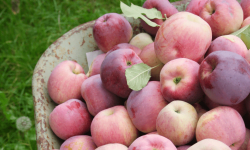Donating 10,000 meals in Pulses! For #WorldPulsesDay Spud is donating 10,000 meals worth with pulses…
If you’re like me, your skin gets really, really dry in the winter. In previous years, I reacted to this cold weather scaly-skin phenomenon by slathering on my ineffective water-based moisturizer numerous times a day, or sometimes just giving up and succumbing to the scaliness altogether. These tactics didn’t do much. In the past few months though, I’ve committed to improving my winter skincare routine and it definitely feels better! Here are my tried and tested tips to baby’s bottom skin in the winter.
5 Winter Skincare Tips
1. Moisturize properly. Everyone tells you to moisturize more during the winter, but the key thing here is to moisturize at the proper time. This is right after a shower or washing your face since hot water removes moisture from your skin. Also, to retain more moisture, take lukewarm showers or – if you’re like me and won’t give up a piping hot shower – shower less often. Your skin will thank you.

2. Consider facial oils. This past year I started using facial oil as a moisturizer. This is the best moisturizer I’ve found – particularly because of my combination skin (if you don’t know what this means, it’s like it sounds: in some areas it’s dry and in others it’s oily). For the dry areas, facial oils help seal in moisture. For the oily areas, they “trick” your skin into thinking it’s already oily enough, which shuts of sebum production and reduces shine. While some commercial lotions are able to do this, oils seem to work naturally and usually have no extra fillers. Huge bonus. It’s also reassuring that facial oils have been used for thousands of years. Note: these oils might not work for everyone, and only certain oils might work (I personally like argan oil. I’ve tried coconut in the past and it didn’t work on my face, but maybe that’s just me). Either way, do some research, listen to yo’ body, and maybe check with your medical professional if you’re concerned. Do whatever winter skincare routine works for you.
3. Drink lots of water. This one has mixed reviews. Some studies say that drinking more water doesn’t actually moisturize skin if you’re already hydrated enough, but if you’re severely dehydrated then yes, it will (although most of us aren’t severely dehydrated). Either way, I have been drinking lemon-infused water for the past few months and I’ve noticed positive changes in my skin. I’m unsure whether this is because of the lemon in my water or the fact that I’m drinking more water altogether or because I’m consciously moisturizing more, but nevertheless it definitely feels more soft and supple than usual. Whether it’s all placebo or not, bottom line is: drinking water doesn’t hurt, and neither do lemons.

4. Your whole body needs love too. Don’t restrict your moisturizing efforts to just your face. If your hands, feet, and legs tend to get dry, be sure to moisturize them often and properly (*ahem* after a shower). For hand creams, Gardener’s Dream is my all-time favourite: it smells like heaven, works like a charm, and lasts forever. For body lotion, I tend to use coconut oil, but you do you. Also, pro-tip: if your feet get dry during winter, moisturize with your favourite cream before bed, put on some socks, and sleep with socks on. This keeps all the good moisture in.
5. Try a DIY face mask. While I don’t use face masks all the time, every once in a while they’re a nice treat. For me, I like making my face masks so that I know exactly what’s in them (plus it’s a fun DIY craft – you can never have too many crafts in your life). In the winter, I always choose moisturizing masks, like oatmeal and honey, since they’re known for their hydrating qualities. Simply take a tsp of honey (add oats if you like), spread it evenly on your face, and wait 10-15 minutes. Wash off and enjoy your uber-soft skin!
These are the tips I’ve tested out, but there are tons more. Give these bad boys a go and hopefully, they work for you too! And if you have any special winter skincare tips that I haven’t mentioned, please share. No one wants Canada’s signature scaliness.

Sources:




